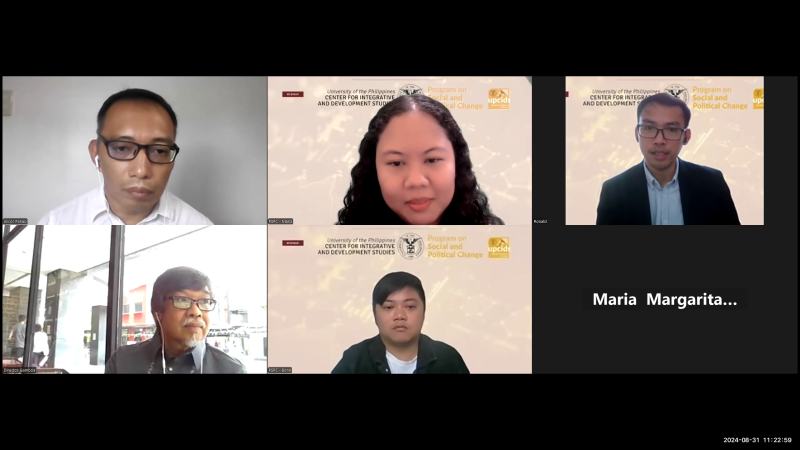Text Mining Can Be Applied in Political Science, UP’s Role in Legislative Policymaking

The University of the Philippines Center for Integrative and Development Studies (UP CIDS) Program for Social and Political Change (PSPC) organized a Zoom webinar last 31 August 2024 to examine and demonstrate how text-mining — the use and analysis of textual data—can be used to derive meaningful information and can be applied for academic research and legislative policy-making.
Termed as text mining, the webinar also aimed to discuss the pivotal yet underutilized role in academic research and use in shaping legislative policymaking. The event was conducted on August 31, 2024 online via Zoom and drew the interest of the academe, students, researchers, government personnels and other stakeholders.
Words play a fundamental role in everyday life, facilitating articulation, communication, self-expression, and understanding of thoughts. Politicians and citizens engage in dialogue to convey opinion, execute proposed actions, and justify decisions. As such, there is a large pool of data in today’s digital age that presents significant potential for rigorous research for informed-decision-making. There are considerations that must be taken into account in text mining.
The webinar featured Dr. Ronald A. Pernia, who gave the presentation, “Text Mining in R: Representing Text as Data.” It is based on his recently published policy brief, “Academia: Serving the People or the Legislature?”
Dr. Pernia began by stating that political science has become a textual field and that a large bulk of unstructured data can be found in emails, online chat logs, posts, and phone transcripts, and even congressional documents such as press releases.
Drawing from his study, Dr. Pernia explained how text mining helps individuals improve their reading of text using the bag-of-words approach, wherein unstructured text is converted into structured and filtered text. However, he also stressed the importance of validating the results of the mining vis-a-vis the “thought” of the text and ultimately, the need for human supervision to make sense of the data.
Moreover, Dr. Pernia showcased an application of text-mining. In his study and presentation, he highlighted the use of sentiment analysis, topic modelling, and web scraping through R in his study of Philippine Congress Press Releases, and Congressional Policy and Budget Research Department (CPBRD) data. Dr. Pernia concluded by saying that there is a need to adapt to the changing landscape of big data and embrace emerging approaches and research designs.
The event also included a reaction from Dominador M. Gamboa, Service Director of the Congressional Policy and Budget Research Department. Director Gamboa discussed practical steps for integrating UP’s research into legislative work. He affirmed and discussed how data and technology are becoming synergistic, opening up new avenues for research such data in the digital age and the rise of artificial intelligence (AI). The reaction also underscored the importance of forging stronger ties between academia and lawmakers to ensure that policies are rooted in rigorous academic research.
His reaction was followed by a Q&A session, which highlighted the growing interest in the topic of text mining. Pertinent questions regarding available software, developments in AI, R packages, methodological steps, quality of data and the difference between text mining from other methods of analysis involving textual data analysis. The Q&A session also discussed areas for research explored wherein text mining is used to investigate topics such as digital “trolls,” the weight of animated gifs and emoticons, and social media analysis.
Dr. Pernia’s research and the insights shared during the webinar are invaluable for policymakers, scholars, and institutions aiming to bridge the gap between textual research and contemporary sources of data. The event also sheds light on how government units frame and communicate governance through their publication materials and electoral incentives. Overall, the webinar demonstrated that text-mining and text analysis can be useful tools to encourage data-driven policymaking for the Philippine political landscape.
A recording of the webinar is available on the UP CIDS’ YouTube channel.
The UP CIDS PSPC is dedicated to leading empirical studies using a variety of methods and approaches to develop a better understanding of the broad and complex social and political issues, disruptions, and transitions the country is facing today. It also provides a platform for collaboration and recommendation among various stakeholders and social actors.
View PSPC’s page and download its publications for free.